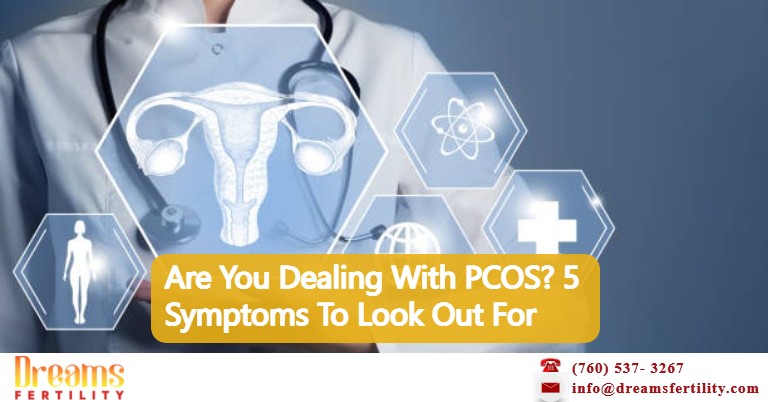PCOS (polycystic ovarian syndrome) is a hormonal disorder that affects women of reproductive age. According to the Centers for Disease Control and Prevention (CDC), PCOS affects from 6 to 12% of American women. While women with PCOS struggle with pregnancy, the health implications of this condition extend well beyond the reproductive years.
What is PCOS?
PCOS, also known as PCOD (polycystic ovarian disorder), is a condition characterized by higher levels of androgen (male hormone) in the female body and subsequent problems of this imbalance. While the female body also produces the male hormone, naturally, it is present in very small amounts.
The normal female cycle includes a finely balanced play of two female hormones – estrogen and progesterone. During every monthly cycle, two more hormones – luteinizing hormone and follicle-stimulating hormone – come into play. This leads to the formation of a follicle that contains some fluid and an egg. When the egg matures, it is released for potential fertilization.
However, in the case of PCOS, high androgen levels disrupt this fine balance and cause multiple follicles to form. There is no signal for these eggs to mature and these follicles eventually turn into cysts inside the ovaries (and hence the name).
This hormonal imbalance causes disruptions in the normal menstrual cycle – prolonged periods, irregular periods, and abnormally heavy periods in some cases.
5 Symptoms of PCOS to Look Out For
PCOS may start during the first menstrual cycle when a female achieves puberty, or in some cases, later in life in response to substantial weight gain. There are certain unmistakable symptoms most women will experience. It is advisable to consult your physician when you encounter them so that they can be treated. The most common symptoms of PCOS you may experience include –
-
Irregular Periods
Long and irregular menstrual cycles are considered to be the hallmark of PCOS. This menstrual irregularity can be attributed to the fact that in women with PCOS, because normal ovulation does not occur, a mature egg doesn’t get released and the cycle does not get completed. This irregularity in periods is the chief cause of infertility associated with PCOS. Research indicates that persistent irregularity in menstrual cycles owing to a hormonal imbalance may increase the risk of certain subtypes of ovarian cancer in women with PCOS.
-
Hirsutism
Hirsutism is the appearance of thick, coarse, dark hair on the body. Hirsutism occurs as a result of “virilization,” the appearance of male features due to high androgen levels, including the growth of unwanted facial hair and hair in places where it usually does not grow on the female body. The hair appears on the face (especially on the upper lip and beard area), chest, lower abdomen, upper arms, upper legs, and inner thighs. PCOS facial hair is a cause for concern for many women.
-
Acne
As many as 35% of women with PCOS experience acne. The higher-than-normal levels of androgen in the female body lead to the overproduction of sebum by sebaceous glands in the skin. Acne occurs when sebum traps dead skin cells and bacteria inside hair follicles leading to inflammation and painful ace (also called cystic acne).
-
Hair Loss from the Head
PCOS also results in hair problems – thinning and loss of hair and a decrease in hair quality (limp, lackluster hair prone to breaking easily). The hair loss is a result of high circulating androgens in the female body and is often referred to as androgenic alopecia or female pattern hair loss.
-
Weight Gain
Many women with PCOS struggle with weight issues. They gain weight fast and find it very difficult to lose weight. Weight gain occurs due to a complex process that has far-reaching consequences on the female body. Women with PCOS become insulin-resistant, meaning their cells are less sensitive to the activity of insulin, a hormone that helps the conversion of sugars into energy. When insulin resistance increases, the body produces more insulin to compensate. This increased insulin levels lead to the formation of more androgen in the body. High levels of androgen then lead to problems like weight gain.
I have some of these symptoms, do I have PCOS?
Although certain signs and symptoms may accompany PCOS, there is no definitive test that diagnoses the condition. Our understanding of PCOS is still evolving and physicians use a combination of tests and medical history to come to the diagnosis.
By asking about the symptoms you have been experiencing and a physical examination (that also includes a pelvic exam) your physician can rule out certain conditions that have similar symptoms. Family history is also important in cases of PCOS, as this condition runs in the family.
PCOS is usually diagnosed if you have at least two of the following three –
- Irregular periods
- High androgen levels (can be detected by a blood test or through symptoms like body hair and facial hair, acne, balding, and thinning or hair)
- Polycystic ovaries (as seen on an ultrasound exam)
Once your physician confirms that you have PCOS, they will likely ask you to get blood glucose and blood cholesterol tests done.These test will give them an idea of your overall health, as women with PCOS run the risk of heart problems and diabetes.
How do I Treat PCOS?
Since the exact cause of why PCOS occurs is still not known, treatment of PCOS is through management of its symptoms. The current treatment strategies not only help with the resolution of the symptoms, but also reduce the risks of other health complications.
To manage PCOS, an active and healthy lifestyle is prescribed. This involves eating well and exercising regularly. Most women with PCOS are obese or overweight. It is found that losing just 5-10% of body weight can result in easing a lot of issues related to the disorder and resolution of symptoms.
To treat the other symptoms, specific medications may be prescribed.
-
Menstrual Problems
Hormonal birth control methods like the contraceptive pill, patch, vaginal ring, shots, or a hormonal IUD (intra-uterine device) can help get your periods back on track. Hormonal birth control reduces the risk of endometrial cancer. A hormone called progestin can also help restore period regularity. However, it does not prevent pregnancies but reduces the risk of uterine cancer.
-
Unwanted Hair
To remove excessive hair growth, depilatories are commonly prescribed. These are creams, gels, or lotions that loosen the protein structure of the hair and make them fall out. Laser treatment and electrolysis also remove hair permanently from unwanted areas. Several laser hair removal sessions are required and this treatment can be costly. Hormonal birth control can also help reduce unwanted hair. In case birth control methods do not control excessive hair growth, an anti-androgen medication called spironolactone is prescribed. This drug lowers the androgen levels in the body leading to the resolution of hair growth and acne problems.
-
Acne
To treat PCOS acne, usually, androgen-lowering drugs like spironolactone are prescribed, along with prescription-strength medications like retinoids. It is also advisable to keep the face as oil-free as possible by using a mild cleanser. Talk to a dermatologist for more options.
PCOS and Pregnancy
PCOS is one of the most common causes of female infertility. While it is difficult for women with PCOS to get pregnant, they are also at a higher risk of developing pregnancy complications, including preeclampsia, preterm birth, and pregnancy loss.
However, it is not the end of the road for PCOS women. With the right lifestyle habits and fertility treatment, women with PCOS can achieve pregnancy and give birth to healthy babies.
To increase your chances of getting pregnant, if you have experienced recent weight gain, you should try to reduce around 5-10% body weight. As noted earlier, even this weight loss can resolve many symptoms and cut down your risk of health complications. A healthy weight can be achieved through eating healthy and exercising.
Your physician can track your ovulation to suggest you the best times to have sex and increase your chances of getting pregnant.
Helping PCOS Women Become Mothers
At Dreams Fertility, we have successfully helped many women with PCOS achieve positive pregnancy outcomes. While we create customized strategies for targeted lifestyle modifications to enhance fertility, we also perform fertility tests and prescribe fertility medication for ovulation induction to help you achieve a healthy pregnancy. If these do not work, we will move toward assisted reproductive technologies like IVF to help you achieve pregnancy.
Schedule a consult with a Dreams fertility physician and start your fertility journey with us.

Dr. Luis Murrain joined Dreams Fertility in 2021, providing specialty services in Fertility and Reproductive Genetics. With a shared vision that everyone deserves to have the family of their dreams, we are dedicated to helping all of our patients. We believe that families come in all shapes and sizes, and all of them are beautiful. We are proud to have a long history of providing services to all, including gay, lesbian, and transgender individuals and couples on their road to parenthood.

